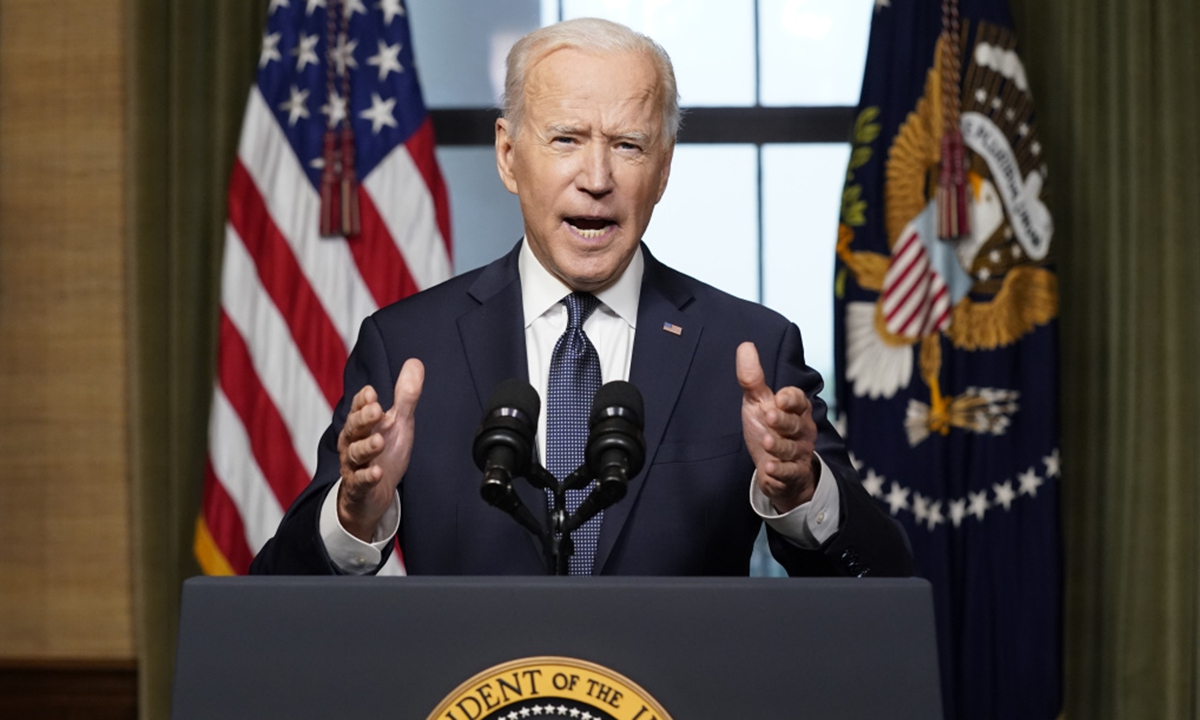COMMENTS / EXPERT ASSESSMENT
Biden’s reported tax hike on wealthy will not be another ‘Robin Hood’ story

President Joe Biden Photo: IC
Following the passing of the latest $1.9 trillion economic stimulus package, the Biden administration is now trying to push through a $2 trillion infrastructure plan. But where is the money? It seems US President Joe Biden’s strategy currently is to raise taxes.
Biden will propose almost doubling the capital gains tax rate for wealthy individuals to 39.6 percent, Bloomberg reported, citing anonymous sources. “For those earning $1 million or more, the new top rate, coupled with an existing surtax on investment income, means that federal tax rates for wealthy investors could be as high as 43.4 percent.”
Less affluent people in the US are showing supportive attitudes toward the policy, and if Biden proposes a tax increase this year and it gets passed, he would be the first US president to raise taxes in 28 years. So far, there are two main reasons for the current US administration’s strong push for higher tax rates.
For starters, there are the economic reasons. The US federal deficit and debt have skyrocketed as a result of the previous Trump administration’s tax cuts and rounds of economic stimulus in response to the COVID-19 pandemic.
In 2020, the US federal government’s fiscal deficit exceeded $3.1 trillion, accounting for about 15 percent of its GDP for the year and almost equal to the total federal deficit in the five years from 2015 to 2019.
If the Biden administration does not raise taxes, the US will be living beyond its means, and the rocketing level of debt will seriously damage US economic growth and the international community’s confidence in the US dollar.
Politics is the other reason. During the election campaign, Biden promised to raise taxes. In addition, he is also facing pressure from heavyweight politicians in the Democratic Party.
Therefore, Biden’s reported tax hike on the wealthy is not to "take from the rich and give to the poor," but to ensure the basic functioning of the US government in the future and to achieve his political goals. Of course, if Biden's tax increase policy can be properly designed and accompanied by other adjustments of welfare distribution policy, it may help to close the wealth gap in the short term. But it still won’t fundamentally reverse the polarization between the rich and the poor in the US.
The root cause of America’s wealth gap is not the current income gap, but the long-term asset gap. The wealth gap is unbridgeable and still growing. Rounds of economic stimulus in the US during the pandemic have actually funneled a lot of money toward the rich. The wealth of US billionaires increased by 34 percent in 2020. Even if the tax plan passes, the overall impact on the wealthy will be limited in the long run compared with the huge assets they already own.
Moreover, uncertainties still remain about whether the plan can be passed. Whether it’s due to different ideologies or political wrestling, Republicans have said that they would not let the policy pass easily.
In the meantime, the epidemic in the US has not yet reached a turning point, and the economy still lacks growth momentum. Biden’s tax plan also includes taxes for companies. Under the current gloomy economic background, increasing taxes may hurt consumption as well as companies’ investment confidence, which would hurt those on lower incomes and also drag down the country’s economic growth in the long run.
As an important measure of macroeconomic policy, tax policy does have its significance, but it is unrealistic to try to achieve various goals just by adjusting tax policy. Deeper structural changes in the US economy are needed if the country intends to shake off its chronic economic problems. The Biden administration’s current economic policy seems more piecemeal, rather than actual structural reform.
The article was compiled based on a commentary written by Song Guoyou, deputy director of the Center for American Studies at Fudan University. bizopinion@globaltimes.com.cn
